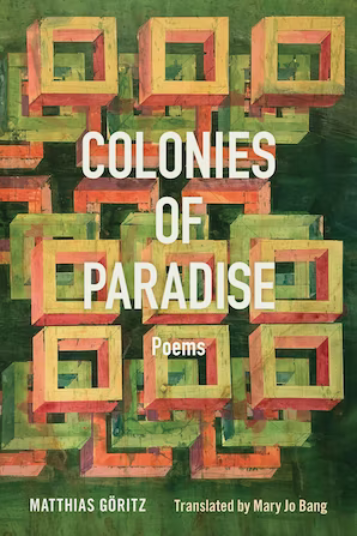Mary Jo Bang and Matthias Göritz worked for years to create a “perfect” poetic translation of Göritz’s early works. They will discuss the project Nov. 2 at Left Bank Books.
When translators work with poetry, they face unique challenges. Mary Jo Bang, professor of English, says the difficulty lies in translating a poem’s voice.
“In novels, we invent a personality and hide behind it, but in poetry, we invent a speaker who has a person standing right behind them, with their own way of thinking,” Bang said. “The longer you work with translating someone's poetry, you begin to see that person behind the voice — how they think, how they use language, and what their preoccupations are.”
In preparing a new translation of Matthias Göritz’s Colonies of Paradise, Bang grappled with these questions to produce what Göritz, professor of practice of comparative literature, describes as the most intimate translation of his work to date. Bang and Göritz will discuss the new translation and their process at Left Bank Books Nov. 2 at 7 p.m.
Translation with a guide
Bang and Göritz share a history of collaboration. In 2014, Göritz published a number of Bang’s poems from her 2007 book Elegy in the German literary magazine Sprache im technischen Zeitalter, along with a short essay about the work. That same year, Bang, who was studying German in preparation for a fellowship at the American Academy of Berlin, began to work on translating a few of Göritz’s poems into English with her tutor, Ervin Malakaj. Göritz went on to publish a translation of Elegy that he did with Uda Sträling (Elegie, Wallstein Verlag, 2018). When Göritz accepted a teaching position in the Comparative Literature program at Washington University in 2016, Bang began to translate the poems in Göritz’s first book of poems, Loops (2001).
Though Göritz speaks English, he wanted someone who could capture the humor and idiomatic language of his German poems in English. The caveat was that Bang does not speak German fluently.
Bang is a practiced hand at translating poems written in languages that she does not speak. For the past 16 years, she has been working on a translation of Dante, so far publishing Inferno (2013) and Purgatorio (2021). Bang begins by feeding a line from the original poem into a computer translator. She then uses crowd-sourced, dual-language dictionaries to comb through the original next to the decidedly un-poetic computer-generated copy. Then, she references earlier published translations.

Bang feels that being a non-speaker of the original language and having to interrogate every possible meaning of each word allows her greater appreciation of the way that poems can surprise readers with language.
“Language is already ambiguous since there are multiple meanings inherent in most words and poetry plays with all those possible meanings,” Bang said. “The poet can send the mind of the reader into all sorts of different directions at once, or at least sequentially, as you try to come to terms with what's being said.”
With Göritz’s poetry, Bang faced a new challenge as well as an opportunity. Two accomplished and well-established German translators, Susan Bernofsky and Michael Hoffman, had previously translated a few of Göritz's poems, but no one had yet translated the entirety of his first book. She could, however, speak to the author, a luxury unavailable when translating the work of Dante, a 14th-century Tuscan poet. If translation is all about recreating that relationship between a poem’s voice and the mind of the author, Bang had a decided advantage in being able to access that mind whenever she had a question.
For six years, Bang and Göritz passed translations of his poems between each other. Bang would ask if she got the poem right, and when Göritz called it great, she would ask, “but is it perfect?” Then, Göritz would explain some minor secondary meaning of a phrase in German, and Bang would open the poem again to find space for more of the original ambiguity.
“I learned so much working with Mary Jo over the years. Her word choices are so intricate,” Göritz said. “Her translation has produced new layers of speech in these poems. It’s made me realize how translation is like creating a second voice to sing a duet with the poem.”
Colonizing language
In one major change that arose through this process, Bang retitled the book Colonies of Paradise, a phrase taken from the title of one of the poems in the volume. In German, Göritz originally titled the book Loops. The new title references a line from a poem by Novalis, one of Germany’s most important Romantic poets who was fascinated with the relationship between language and the world.
“When Mary Jo suggested the new title, it made so much sense. If poems are little colonies of language in reality, who is doing the colonizing? Is poetry enough to change the world? This translation process really made me address all of these questions again in relation to my work,” Göritz said.
“For me, a poem is always like an architectural construction, but living. As a reader, you should be able to enter this building and feel all of those layers laid over one another.”
In Colonies of Paradise, Göritz reflects on his childhood and the experience of living in the United States for the first time as an adult. He writes about the uncanny experience of walking through the grid layout of Chicago after having grown up in Germany, where the streets often follow older medieval designs.
Bang wanted to keep the balance between sadness and humor that characterizes so many of Göritz’s poems from this period. She describes the poems as slightly heartbreaking because they look back at a vexed childhood with an adult’s eyes, but notes that a surprising humor emerges through his use of language.
“I wanted to capture that humor, and maybe that’s part of what creates a new voice in these poems,” Bang said. “In his own voice, that humorous, backward-looking perspective is communicable. It was important to preserve that humor in the language of the translation.”
Göritz says that the gap between speaker and memory makes self-translation limiting for him. He tried translating his own poems into English in the past, but he needed a translator like Bang whose ears were sensitive to the way that voice and language worked in his poetry to satisfactorily bring the book into English.
“Mary Jo’s translations are risky. They show the riskiness of somebody going through the streets of a foreign city and questioning everything. For me, a poem is always like an architectural construction, but living. As a reader, you should be able to enter this building and feel all of those layers laid over one another.”
Mary Jo Bang is the author of eight books of poetry — including Elegy: Poems, which received the National Book Critics Circle Award — and the translator of Dante’s Inferno, illustrated by Henrik Drescher, and Purgatorio. She has received a Hodder Fellowship from Princeton University, a Guggenheim Fellowship, and a Berlin Prize Fellowship. She teaches creative writing at WashU.
Matthias Göritz is a poet, translator, and novelist. He has written four poetry collections: Loops, Pools, Tools, and Spools; four novels, including Der kurze Traum des Jakob Voss (The Brief Dream of Jakob Voss) and Parker; and three novellas. He has received the Hamburg Literature Prize, the Mara Cassens Prize, the Robert Gernhardt Prize, and the William Gass Award. He teaches at WashU.




